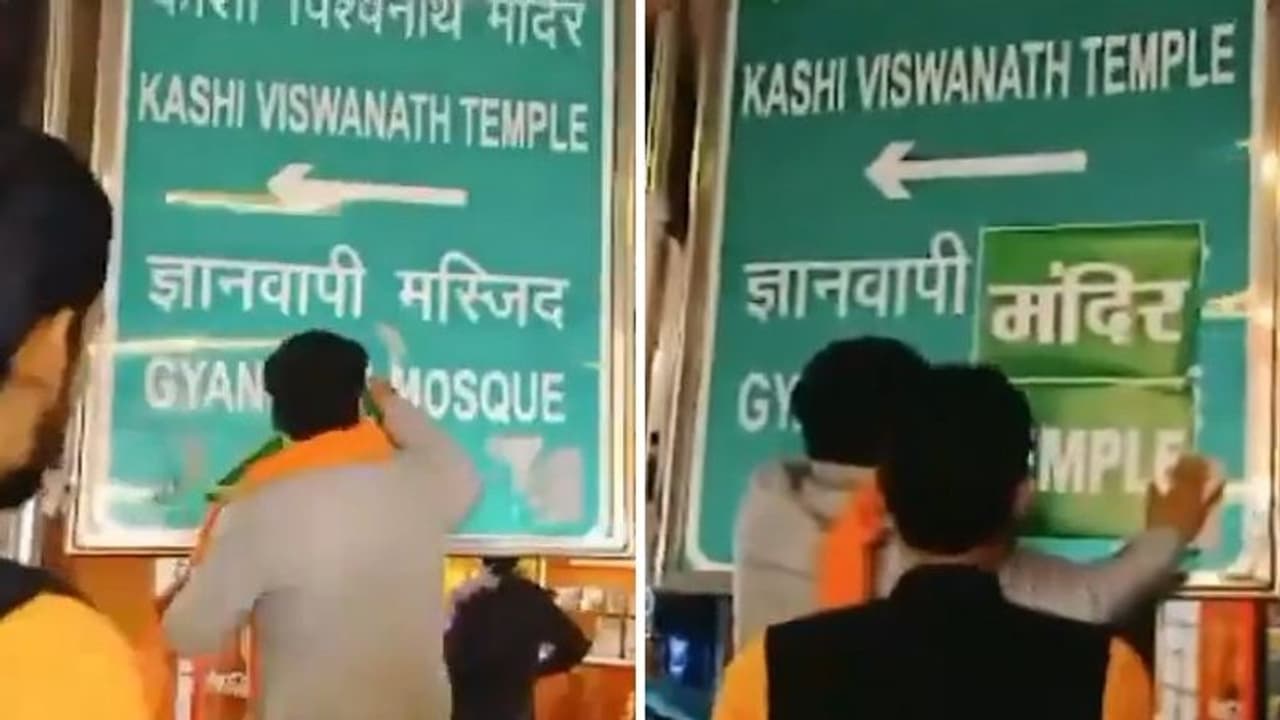This viral video comes a day after a Varanasi court ruling that granted permission to Hindu petitioners to worship inside the previously sealed basement area known as 'Vyas ka tekhana' within the Gyanvapi mosque complex.
A viral video circulating on social media has captured a significant moment in Varanasi, where people were seen replacing the words "Masjid" and "Mosque" with "Mandir" and "Temple" on a signboard outside the Gyanvapi Masjid complex. The signboard, which originally indicated the direction towards the Gyanvapi Masjid and Gyanvapi Mosque, now reflects the changed terminology, showcasing "Gyanvapi Mandir and Gyanvapi Temple" instead. Above the signboard, prominently displaying "Kashi Vishwanath Temple," a directional arrow points to both religious places.

Also read: Relocate mosque, hand over Gyanvapi structure to Hindus: VHP on ASI report
This development comes a day after a Varanasi court ruling that granted permission to Hindu petitioners to worship inside the previously sealed basement area known as 'Vyas ka tekhana' within the Gyanvapi mosque complex. The decision has sparked fervent reactions and discussions across the nation.
The video captures individuals diligently making alterations to the signboard, symbolizing a shift in perception and narrative regarding the religious identity of the religious site. The change reflects the sentiments and beliefs of a certain segment of the population that has long advocated for recognition of Hindu heritage and religious significance in Varanasi.
On Wednesday, the judge also mandated that arrangements, including the removal of barricades, must be completed within a week. Furthermore, the court stipulated that prayers should be conducted by priests from the Kashi Vishwanath Temple.
"Hindu side allowed to offer prayers... district administration will have to make arrangements in seven days. Everyone will have the right to pray there," Vishnu Shankar Jain, the lawyer for the four Hindu women petitioners in this case, said.
The mosque committee is expected to challenge this order in a higher court.
The mosque's basement comprises four 'tekhana', or cellars. One of these remains under the possession of a family of priests who once resided there. The family contended that, as hereditary priests, they should have access to the structure to conduct pujas.
According to the petition, priest Somnath Vyas used to perform prayers until 1993 when access to the cellar was restricted.
Earlier claims suggested that debris from statues of Hindu gods was discovered during a survey of the area. Additionally, it was asserted that parts of a pre-existing structure, designated as a temple in an ASI report, including pillars, were utilized in the construction of the mosque.
Also read: Hindu temple structure existed at Gyanvapi mosque complex: ASI report
On Tuesday, four Hindu women petitioned the Supreme Court, requesting an excavation and scientific survey of a 'shivling' purportedly discovered within the sealed 'wazukhana' area of the mosque complex.
In 2022, this area was sealed following a Supreme Court order. However, the Hindu side has now petitioned the court for the Archaeological Survey of India (ASI) to conduct another survey of the 'wazukhana' area, ensuring the preservation of the 'shivling'.
In a significant ruling last month, the Allahabad High Court dismissed all petitions filed by the mosque committee, which had contested civil suits seeking the restoration of the temple at the site.
The case primarily concerns the Gyanvapi mosque, situated adjacent to the iconic Kashi Vishwanath Temple.
The High Court deliberated on and rejected petitions, including two from the Uttar Pradesh Sunni Central Waqf Board, contesting the maintainability of a 1991 case before a Varanasi court.
The 1991 suit, filed on behalf of the Adi Vishveswar Virajman deity, aimed to assert control over the disputed premises. In response, the Anjuman Intezamia Masajid Committee and the Waqf board challenged the suit's maintainability under a law that prohibits altering the character of religious places as they existed on Independence Day, August 15, 1947.
The petitioners contended that since the dispute predates Independence, it would not be affected by this law.
